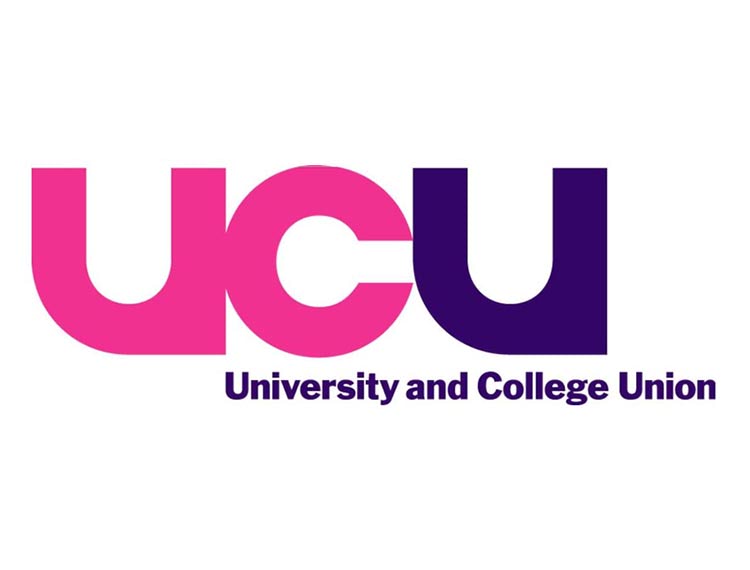Government’s failure to instruct universities to move to online learning where possible will put public health at risk, say unions

@UCU and @NUSuk issue joint statement calling on universities to move online where possible for new English lockdown
The University and College Union (UCU) and the National Union of Students (NUS) have said that the government’s failure to instruct universities to move to online learning where possible would put public health at risk.
UCU and NUS have issued a joint statement (4 Nov) calling on the Westminster government to revise their guidance for universities, and issue a clear call for working to be immediately moved online wherever possible during the current lockdown in England.
The unions said that the latest government advice on online learning was contradictory. Government guidance on the 31 October stated that universities and adult education settings should “consider moving to increased levels of online learning where possible” but a letter from the universities minister Michelle Donelan to vice chancellors on Monday called for universities to ensure “all students have some form of face-to-face learning” and updated guidance on the 3 November states “We would expect face to face teaching to continue”.
UCU and NUS said that instead of sending mixed messages, the government should encourage all universities to follow the example of institutions who have already moved their provision online following the lockdown announcement.
 UCU general secretary Jo Grady said:
UCU general secretary Jo Grady said:
‘The health and safety of the country is being put at risk because of this government’s insistence that universities must continue with in-person teaching. Lessons need to be learnt from the outbreaks we have seen on campuses across the country this term.
‘Some universities have already moved the vast majority of their teaching online since the national lockdown was announced; instead of issuing contradictory advice we now we need ministers to step in and tell the rest to follow suit. The government must use this period to establish a workable test, trace and isolate system so the country can stop yo-yoing in and out of isolation.’
 NUS president Larissa Kennedy said:
NUS president Larissa Kennedy said:
‘The government needs to give students some power and control over their lives again. They sold students a lie of a normal student experience in the summer, and dragged everyone back to campuses to get their rent money and then blamed them for a second wave.
‘This has got to stop, and it’s causing a huge toll on students’ mental health. Let students leave their halls, their rental contracts and their courses without financial detriment; support those who want to stay. Students deserve better than being scapegoated, lied to and left in the dark about their rights throughout the pandemic.’
 David Hughes, Chief Executive, Association of Colleges, said:
David Hughes, Chief Executive, Association of Colleges, said:
“Since the beginning of the pandemic, colleges have worked hard to implement government guidance, alongside Public Health England advice to protect the health of their community, and ensure that learning continues. They are doing all that they can to protect staff and students and are continuously monitoring and adapting to changes – often at speed, with no precedent, and at great cost.
“Ofsted have said that from their first interim visits it is clear that students appreciate being in college, having face-to-face learning, where possible. It is good for students’ mental health and for their social wellbeing. Colleges are rightly working with Public Health England to make local decisions based on local circumstances, and they should continue to do so.
“UCU are right to point to the costs attached to making colleges COVID-secure, including supporting students with digital devices and access – as it stands, colleges have borne the brunt of this – so it is important that government invests so that learning can continue and students and staff are safe.”
UCU and NUS have consistently warned that government and universities were taking chances with the health and safety of students, staff and local communities.
A previous joint statement issued in October highlighted concerns that the Westminster government had ignored its own pandemic modelling group that showed halls of residences and in-person teaching were areas of risk.
UCU has collated over 35,000 cases of Covid on campuses across the UK. It has also launched a legal challenge to the government’s decision to ignore advice from its Scientific Advisory Group for Emergencies (SAGE) to move learning at universities online.
Full joint UCU and NUS statement
The University and College Union (UCU) and National Union of Students (NUS) remain extremely concerned that the government ignored its own Scientific Advisory Group for Emergencies (SAGE), an action which prompted UCU to launch a judicial review.
Since the return to campus in September, universities have become incubators of Covid and transmission hotspots. We may never know the full cost of the government’s decision to ignore SAGE’s advice to move learning online, but we do know that infection rates have been up to seven times higher at universities than in surrounding areas, and we are now deep into a second Covid wave. Continuing in-person learning where it could reasonably be delivered remotely risks unnecessarily inflating infection rates around campus.
We are very concerned that universities will continue to see outbreaks on this scale unless they immediately move to online learning where possible.
In light of the government’s updated guidance advising those who are Clinically Extremely Vulnerable (CEV) to work from home, we are further concerned that a failure to move provision online where possible will lead to avoidable disadvantages for CEV staff and students.
Many students have already spent the duration of this term yo-yoing in and out of self-isolation, separated from family and friends, when they could otherwise have been at home. Staff have been exhausted by the demand to provide blended learning, and all involved have been required to take needless risks with this safety. This has also taken a huge toll on student and staff mental wellbeing. Students must be allowed to leave campus without facing financial detriment.
The government failed to ensure an adequate test and trace system in the summer – it must not make the same mistakes now.
The government must use this four week lockdown wisely by shifting to online learning and getting an effective test and trace function in place
We are calling for:
- Immediate move to online learning wherever possible
- Give students the right to leave, or stay, safely: we need to see urgent investment of resources so that students are offered a safe way to leave campus if they need or want to, and support, including mental health support and wellbeing resources
- No financial detriment to any student giving up accommodation, or choosing to defer or leave university
- Increased provision of mental health support for students, across universities and colleges
- Invest in digital technology, end digital poverty: ensure that tech and equipment cease to be barriers in accessing their education as much as possible
- Guaranteed funding for universities and colleges to help them deal with any shortfall or additional expenses due to Covid-19.
“Move universities online now” – union’s demand to PM
The University and College Union (UCU) wrote (29 Sept) to Prime Minister Boris Johnson* to urge him to make online learning universities’ default position, protect students’ education and stop any further damage to community health.
The union accuses universities of hiding behind government guidance and calls for the prime minister to adopt a clear policy that the majority of teaching should be online. UCU also calls for students to be allowed to return home if they wish without fear of financial penalty for leaving student accommodation.
On theeveningof 25th Sept, Manchester Metropolitan University locked down around 1,700 students in halls of residence. Despite this, the university said it was only moving learning online for foundation year students and first years.
Yesterday Professor Mark Woodhouse, from the government’s pandemic modelling group, said that the current crisis was not only “entirely predictable”, but that modelling showed halls of residences and in-person teaching were areas of risk.
 UCU general secretary Jo Grady said:
UCU general secretary Jo Grady said:
‘Given the rapidly changing situation and the increasing Covid outbreaks, now is the time for swift action and to move the majority of universities’ work online. We are not prepared to take chances with the health and safety of students, staff or local communities.
‘Manchester Metropolitan University shifting teaching online only for foundation and first year students, for example, exposes the absurdity of trying to continue with blended learning. There is no point encouraging students to come to university to self-isolate for a fortnight and doing so now looks even more like a cynical effort to extract accommodation fees and then worry about what to do.
‘We cannot have students forced to quarantine in halls of residence with no familiar support network, or staff forced to carry out work on site that could be conducted more safely from home. Students must be allowed to safely return home if they wish to and without fear of financial penalty for leaving their student accommodation.
‘We now understand that pandemic modelling identified halls and in-person teaching as areas of risk, yet the government insisted universities continued to welcome students . We want the Prime Minster to explain why that modelling was ignored.
‘We believe summer spent selling a university experience to prospective students that couldn’t be delivered would have been better spent following the science and preparing properly for this inevitable crisis.’
* Full letter
Dear Prime Minister
Safety on campuses – minimising in person teaching
I am writing from the University and College Union to urge you strengthen and clarify the current guidance for the safe return to university campus, and to ensure Covid-19 does not threaten to derail our students’ education and further damage the health of our communities.
Given the rapidly changing situation and the growing prevalence of Covid-19 across the country, and with the number of outbreaks on university campuses even at this early stage of the new academic year, now is the time for swift action and to ensure online teaching becomes the norm.
As you will be aware, UCU has been calling for some time for all higher education activity that can feasibly be undertaken remotely to be done so, and we have set out this position in the discussions with your colleague, universities minister Michelle Donelan.
We are only a week or two into the new academic year, and we already have Covid-19 outbreaks at institutions in Newcastle, Manchester, Leeds, Edinburgh, Glasgow and Dundee, and these are unlikely to be the last examples.
We know that the virus spreads exponentially indoors and that it is most prevalent amongst 17-21 year-olds. We have also seen the terrible impact that the virus has had already in this country, and my union is not prepared to take chances with health of students, our members and the communities they serve. It is clear that remote learning should be the default for campus life while we are in this precarious position with the virus.
However, what we are seeing on the ground is university employers hiding behind the government’s current sectoral guidance, with all the ambiguities associated with the term “blended learning”.
Professor Mark Woodhouse, from your government’s own pandemic modelling group, said yesterday that the current situation was not only entirely predictable, but that modelling showed halls of residences and in-person teaching were areas of risk.
Whilst other sectors are being encouraged by the government to work from home to help control the spread of the virus, universities are requiring staff to travel across their local regions to work on-site and in-person with any number of students.
Considering the known risks associated with in-person teaching and students living in close quarters, why did the government not insist on minimising in-person teaching and students travelling to universities?
We have concerns that universities are taking this stubborn position because they depend on rents from student accommodation – and because your own government refuses to step in and underwrite universities’ lost income for the duration of the pandemic to ensure they are not negatively impacted and jobs are not lost.
Our union is urging greater leadership from government on this matter, and clearer direction from you that all activity that can be done online should be done online for the time being. Taking this more sensible and cautious approach will help address the severe anxieties of staff in the sector, reduce in-person interaction between students, and help limit the spread of the virus.
I recognise the need to keep universities open, and your commitment to this, but I am urging you to join us in calling for all institutions to follow the example of providers such as Birkbeck London, Liverpool John Moores and Liverpool Hope, and move away from the lecture hall and to high quality online teaching as a way to protect staff and students.
Campus life cannot currently be safe with in-person teaching. Those currently working and studying in our universities need a national strategy that accepts this, moves teaching online for the duration of this term, and ensures students can safely return home where possible.
Action is needed now to protect the safety of students, staff and the wider community at this pivotal moment in the epidemic and I look forward to hearing from you.
Yours sincerely
Jo Grady, General secretary, University and College Union











Responses